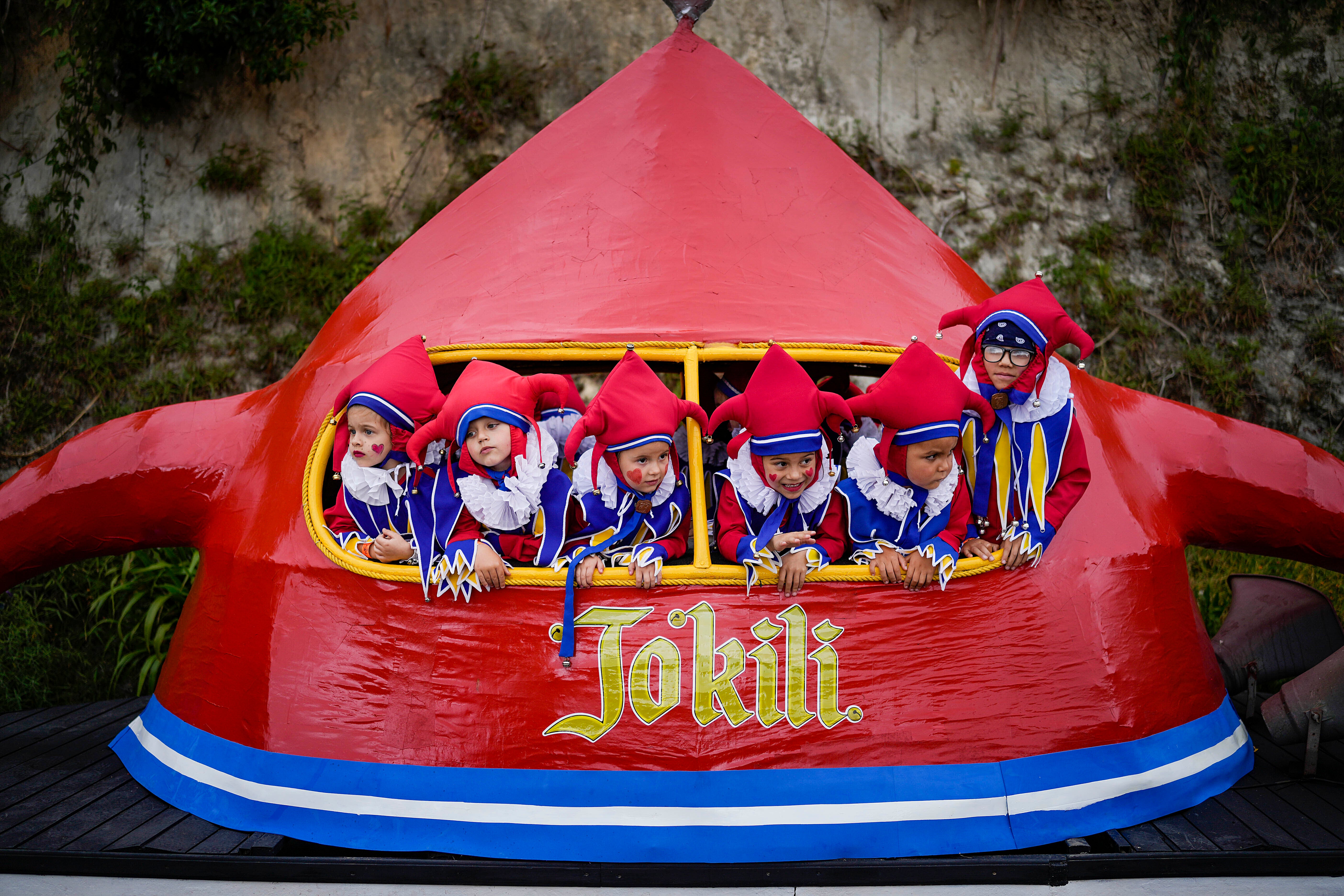Folk, harlequins part of Venezuela's German town carnival
It is carnival season in Venezuela, but in this community tucked in a mountain range, no salsa, cumbia or reggaeton plays at the parade

Under the visible threat of rain, dozens of children and adults are dancing to Alpine folk music as they move through the hilly streets of this small community tucked in a mountain range. Their predominantly bright-red harlequin costumes contrast against the half-timbered buildings lining the roads and chalets doting the background. They wave enthusiastically at the crowds snapping selfies and videos.
No salsa, cumbia or reggaeton plays at this parade. This might be Venezuela, but at this German enclave the yearly carnival celebrations are steeped in tradition and offer locals and tourists — national and international — a very different take on the Caribbean beach-and-booze parties typical of the days leading to Ash Wednesday.
“It’s very iconic,” Shantal Sandoval, 14, said Saturday before getting dressed as a harlequin, which is considered “the joy of carnival. It is the spirit of carnival.”
Some harlequins wear masks with exaggerated facial features while many others carry a wooden stick with an attached dried pig bladder acting like a balloon. They playfully hit the crowds with it as they dance around. Their costumes also incorporate blue and yellow, the other colors of the Venezuelan flag.
Founded by German immigrants in the first half of the 19th century, Colonia Tovar is an agricultural community about 45 miles west of Venezuela’s capital, Caracas. The strawberries, peaches, garlic and other temperate crops grown here are sold across the country. So are the charcuterie products, baked goods and candy produced in various facilities.
The village is also a tourist attraction with charming hotels and restaurants and an Oktoberfest. Its weather offers a respite from the Caribbean heat.
Carnival celebrations last a few days across the country, and people get the days off from work and school. The partying was suspended in 2021 because of the coronavirus pandemic, but it returned this year with attendees urged to wear masks.
Philippines native Brigette Javier, a middle school science teacher in northern Venezuela, traveled with a group to the community for the celebrations and to enjoy the cool weather. She saw YouTube videos of the area before her trip and was surprised by the distinct architecture.
“Most of my students said ‘Oh, go to the beach.’ But most of the other people around said ‘Oh, everyone will go to the beach,’” said Javier, 39. “So, we needed to go farther, and Colonia Tovar is the best place... It’s so nice that you have one German community, and it’s in Venezuela. Who would think that?... The houses, all the designs, the facades, it’s so nice.”
Wannabe harlequins at Colonia Tovar must pass an interview, be area residents for several years, care for their costumes and learn history and other facts they can share with tourists, effectively becoming ambassadors of the community during the celebrations. Their parade dances are followed by the much looser participation of several children and adults covered in moss and gorilla masks.
The origin of the carnival festivities dates to colonial times. Nowadays, dances, parades, bull fights, pageants and many other activities are associated with the celebrations, which vary among regions of the South American country. Contemporary music aside, the songs played during the festivities also depend on the geographic location.
“It depends on the makeup of the population, on what the historical processes of the regions are,” independent anthropologist Raquel Martens said. “In the east, there is a larger population of Afro-descendants than there is in the Andean region... For example, here in Mérida, as it is closely linked with bullfighting, there is music from Spanish. In the Callao (region), the music is Afro-descendant, from the Antilles.”
The celebrations have withstood the test of the country’s protracted economic, social and humanitarian crisis. They are smaller that before, and many partaking use them as an excuse to forget about their daily challenges. Others who many years ago had the means to travel outside Venezuela now use the holiday as their vacation.
Mayte Paredes, 65, said Venezuelans always try to find ways to enjoy life. She lives in a community near the beach about two hours away from Colonia Tovar and traveled to the enclave with friends and sisters.
“You travel close to where you live,” said Mayte Paredes, who works at a dentist’s office. “I want to see the difference between the (carnival) over there and over here. It is calmer here.”
Bookmark popover
Removed from bookmarks